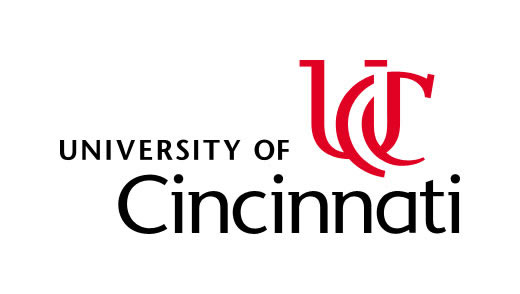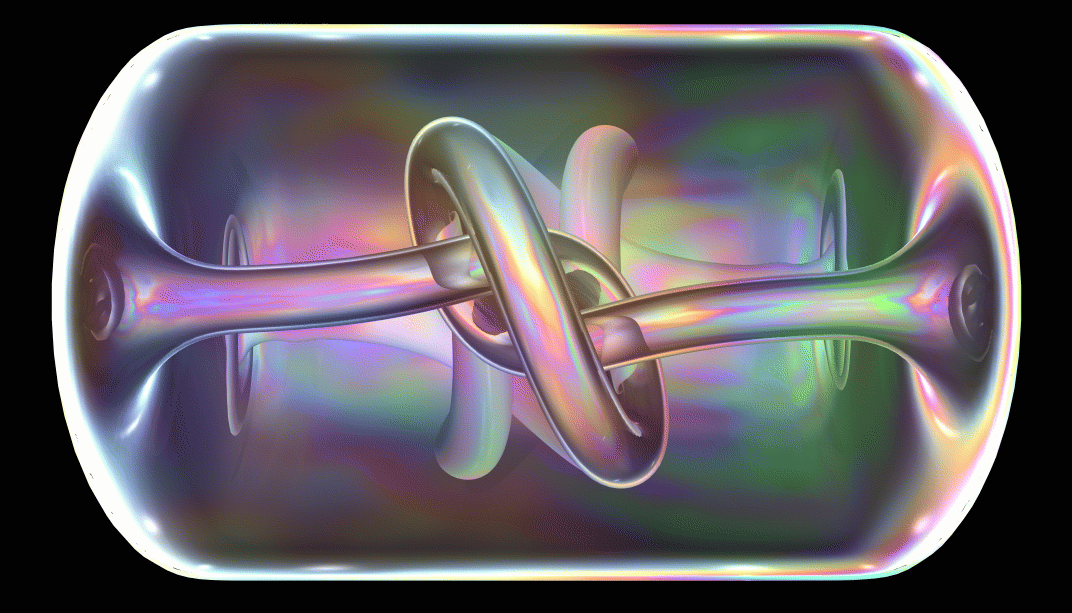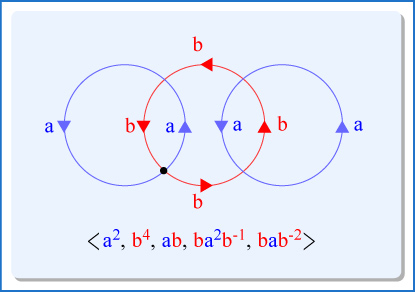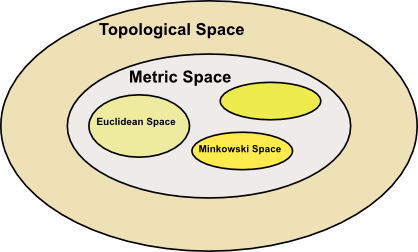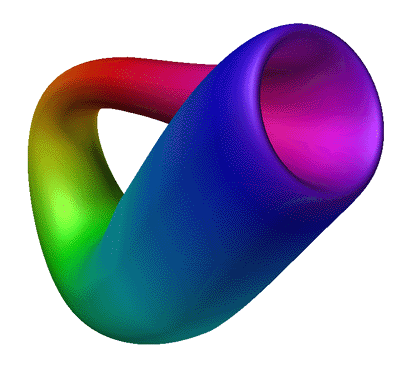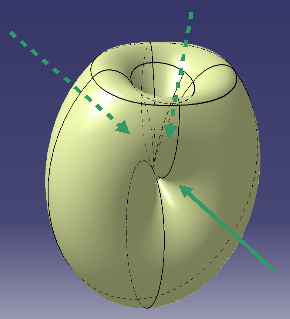|
General Topology
(15-Math-603) |
open and closed sets, topology bases, Hausdorff spaces, manifolds, topological groups, product and quotient spaces, group actions, connected spaces, compact spaces, simplicial complexes, triangulations, presentations and classification of compact surfaces, compact-open topology |
Department of
Mathematical
Sciences |
|
|
|
|
|
This page is a work in progress! (Last revised 21 September 2010)
Instructor Prof David A Herron
810D Old Chem Bldg, 556-4075 |
My Office Hours
Mon, Wed 1:00-2:00 and by appt |
Link to a list of problems. |
Problem Session
TBA |
Below you can find information regarding: this week's hot topics, some suggested problems, and
homework.
Textbooks
There are many topology texts available in the Geo-Math-Physics Library. I have placed some of these on open reserve---if you check one out at the end of the day, you can keep it over night.
Below I list the primary texts that I will use to generate my lectures; the order is somewhat indicative of how I will use these. It's a good idea to look at more than one book, because often some author will say things in just the 'right' way. Also, do not overlook the web as a resource; e.g., a google search on "identification spaces" will yield a number of interesting useful links.
For the most part, I will follow the text by Lee. This does not contain everything that you should learn about general point-set topology, but it will serve well for both Autumn and Winter Quarters, and will set the stage for Spring Quarter. The book by Munkres is a great reference for point-set topology; you can prolly get it cheap on e-bay. I personally rather like Sieradski's book. Each of L, Mu, S, K, B covers the material that we will study Autumn and Winter. The books by Hatcher and Bredon are somewhat more sophisticated than the rest, but are great references for Winter and Spring Quarters.
| L |
Lee |
Introduction to Topological Manifolds |
| Mu |
Munkres |
Topology |
| S |
Sieradski |
An Introduction to Topology and Homotopy |
| K |
Kahn |
Topology, An Introduction to Point Set and Algebraic Areas |
| Ma |
Massey |
Algebraic Topology: An Introduction |
| H |
Hatcher |
Algebraic Topology |
| B |
Bredon |
Topology and Geometry |
General Syllabus Chapters: 1-6 in L; 1-7 in Mu; 1-8 in S; 1-7 in K; 1 in B.
Course Goals
First and foremost, this is a course geared towards teaching you to think, act, and problem solve like a mathematician. Of particular importance, to me, is your acquiring the ability to communicate mathematical ideas effectively. This means learning how to read, and especially to write, mathematical proofs. In addition, you should come to understand that different environments lend to different communication requirements.
We shall study elementary point-set topology (and later, the roots of algebraic and differential topology). A subgoal, at least for some of you, is preparation for the preliminary PhD examination in Topology; I will have (much) more to say about this in spring quarter (at which time I will run a prelim practice problem session). Here is the prelim syllabus. You can find copies of past prelim exams here.
Grades
Your final course grade will be determined from your performance on two midterm exams, a comprehensive final exam, some take-home quizzes, your homework scores, your written assignments, and your classroom and problem session participation. Roughly speaking, an A means that your work is at the PhD level, a B indicates masters level work, and anything less describes work that is not at the graduate level. Here is a precise breakdown:
- 30% --- final exam
- 30% --- two in-class hour exams
- 25% --- homework and assignments
- 10% --- take-home quizzes
- 05% --- class and problem session participation
The Final Exam is scheduled for Friday 10 December at 1:30-3:30. The in-class hour exams are (tentatively) scheduled forWednesday 20 October and Friday 19 November. At certain unannounced classes I will distribute take-home quizzes that will be due before the next class.
You should be sure to work all of the exercises as well as the problems in the text. I will use some of these on the exams and quizzes.
I plan a long list of suggested problems for your Homework & Problem Session; these will be in addition to the textbook problems. We will have a weekly hour long problem session. Here I will expect you, the students, to present solutions to certain of the homework problems. We can also talk about other problems and/or topics from the lectures. If we have not done so beforehand, on the first day of class we will decide when to hold the problem session. I will also ask you write up and hand in solutions to certain exercises; these will be graded and returned to you. See below for due dates. I'll say more about this in class.
During the problem session, I will draw names at random (continuing until everyone has been chosen). When your name is chosen, I will ask you to work one of the suggested problems (see the table below). If you have nothing to say, you will receive -1; if your solution is valid, with sufficiently many details correct, you'll get +2; a partial solution will get you +1.
Here are some interesting *things* such as links, movies, etc. I will add to this list as the year progresses.
Topics Covered (although not necessarily in this order!)
- Topological Spaces
- topologies, bases, subbases
- open sets, closed set, limit points
- continuous maps, open maps, homeomorphisms
- Construction of Spaces
- product and quotient spaces
- identification spaces and group actions
- disjoint unions, wedge products, adjunction spaces
- simplicial complexes
- Manifolds
- basic definitions and examples
- Whitney's embedding theorem (baby version)
- connected sums, handles, cross handles, cross caps
- classifications of curves and closed surfaces
- Connected Spaces
- connected versus disconnected
- local connectivity
- path connected, locally path connected
- Compact Spaces
- compactness vs limit point compactness vs sequential compactness
- Weierstrass property
- local compactness
- compactifications
- Complete Metric Spaces
- completeness versus compactness
- total boundedness
- Heine-Borel property
- completions
- Baire category thoery
- Function Spaces
- pointwise convergence topology
- uniform convergence topology
- compact-open topology
- Arzela-Ascoli theorems
22,24 Sept This week we start by learning the definition of a topological space. We'll see a bunch of examples, and talk about continuous maps, topology bases, and manifolds.
Start reading the text: the preface, Chpt 1, pp.337-352 in the Appendix, and pp.17-19 in Chpt 2.
27,29 Sept, 1 Oct This week we look at closed sets and define the interior, closure, and boundary of a set. We also learn how to detect when a point is in the closure of a set. This leads us to the notion of a limit point (also called accumulation or cluster point).
4-8 Oct This week we learn about Hausdorff spaces and manifolds. Then we turn to subspaces and product spaces.
11-15 Oct This week we finish product spaces and then investigate identification spaces.
18-22 Oct We started quotient spaces, then you took Exam I! Then we finished quotient spaces, for now.
25-29 Oct This week we briefly discuss the notion of quotient modulo subspace. Then we begin discussing connectivity.
By now you should have read all of Chpts 1,2,3 (pp. 1-15, 17-38, 39-58) and the Appendix (pp.337-352). Start reading Chpt. 5 (pp.65-72 but not p.69 --- for now!).
1-5 Nov This week we continue our study of connectivity: we investigate components, then examine path connectivity.
8-12 Nov This week we continue our initial study of
15-19 Nov Exam II time!
22,24 Nov This is a short week due to Thanksgiving. We begin our investigation of
29 Nov, 1,3 Dec The final week
10 Dec Our Final Exam is scheduled for Friday 1:30-3:30.
Below I list suggested problems for each indicated Chapter in Lee. There are also exercises throughout the chapter; you should work all of them!
- Chpt 2, pp.36-38, all good but especially 2,3,5,8,9,12,16
- Chpt 3, pp.62-63, all good but especially 3,4,5,6,7,8,10,11
Unless I explicitly indicate otherwise, you should read everything in Lee's book and work all of the exercises that you find as you read. Any of these exercises, as well as all of the "fill in the details" that I mention during lectures, are fair game as "easy" exam questions.
Below is the assigned homework with due dates. (Here, again is a link to a pdf file for a list of these homework problems). The "Problems To Hand In" are to be written up and handed in before class on the indicated dates. The "For Session" problems will be discussed in that week's problem session. The notation m-n/p.q stands for problem m-n in Chapter m on page q of Lee's text. After the due date, you can find outlines for solutions (at least for some of the problems) by clicking the appropriate problem number.
| Due Dates |
Problems To Hand In |
For Session |
| 22,24 Sept |
No Class |
First Day |
7 |
No Session |
| 27,29 Sept; 1 Oct |
10,12,16 |
20 |
|
1,4,8,9,13,14,15,(2-5,2-6,2-7)/pp.36-37 |
| 4,6,8 Oct |
23,2-5/p.36,2-8/p.37 |
28, 31 |
2-16/p.38 |
18,19,21,25,27,(2-6,2-7)p.36, |
| 11,13,15 Oct |
30,32,35 |
|
(2-15,2-17)/p.38 |
26,29,34,(2-11,2-13,2-14,2-17)/pp.37-38 |
| 18,20,22 Oct |
(3-3,3-7)/p.62 |
Exam I |
|
No Session |
| 25,27,29 Oct |
|
|
39,41,52,57 |
36,39,41,50,51,53,55,58 |
| 1,3,5 Nov |
59 |
|
63,64 |
58,61,62,65,68 |
| 8,10,12 Nov |
66,67,69 |
|
74,80 |
71,75,84,86,88,89,92 |
| 15,17,19 Nov |
81,87,93 |
|
Exam II |
Exam Review |
| 22,24,26 Nov |
70,94 |
|
Trky Day |
TBA |
| 29 Nov; 1,3 Dec |
all from Lee: 5.1-5.7,5-2,5-3,5-4,5-5,5-6,4-11,4-12,4-13 |
Final Exam Review |
| Friday 10 Dec |
| Final Exam 1:30-3:30
|
